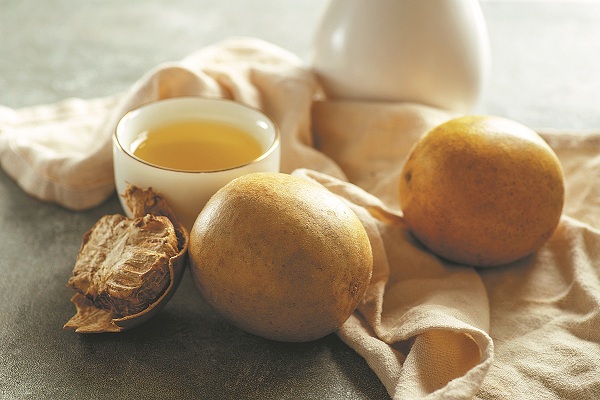Lives of Guangxi fruit farmers sweetened by prosperity
Editor's note: This series of stories looks at local enterprises in specialized sectors that have a share in global markets.
Zhou Huaguo, 38, hadn't always planned to be a fruit farmer.
"I never had the required expertise or experience. Without the proper technology, I was also afraid I wouldn't be able to fully harvest the crops," said Zhou, who was barely able to make ends meet when he sold agricultural products like seed and fertilizer.
However, in the past decade, Zhou steadily surmounted his doubts and difficulties and even became an internet celebrity — all by successfully cultivating luohanguo, also known as monk fruit, in Longsheng county in Guilin, South China's Guangxi Zhuang autonomous region.
China is a major producer of luohanguo, which is used as a major ingredient in traditional Chinese medicine. In other Asian countries, including Malaysia and Singapore, where TCM is also widely practiced, the fruit is used for treating ailments ranging from coughs and sore throats to lung and intestinal conditions. In addition, it is used in herbal preparations in a growing number of Western markets.
The fruit's intense sweetness and antioxidant properties also make it a healthy alternative to sweeteners in a wide variety of food products. Guilin, in Guangxi, has a history of more than three centuries of cultivating the fruit and accounts for most of its output in the country.
Guilin's luohanguo products, including dried fruit and extracts for beverages, have been exported to 26 countries and regions, including the European Union, according to the city's customs authority.
In the first half of this year, Guilin exported 356 million yuan ($49.7 million) worth of luohanguo and related products, up 65 percent year-on-year, according to customs figures.
With global demand for luohanguo extract increasing, the sector is poised to tap huge potential. Worldwide annual sales of sugar and sweeteners is valued at around $70 billion, but natural sweeteners account for less than 0.5 percent of that, according to industry statistics.

Luohanguo tea. CHINA DAILY
The latest investments in the lucrative market mean that technology is giving a significant leg up to local farmers like Zhou Huaguo.
In 2012, Zhou began cultivating luohanguo through a cooperative arrangement with Monk Fruit Corp, a science and technology enterprise that specializes in the fruit's complete industry chain and has about two decades' experience in the field.
"Since working with the company, I've had no worries," Zhou said.
"The company not only offers reliable prices, but also provides technical guidance throughout the entire process of exploring cultivation techniques and models that are suitable for farmers like me. Especially with the dry weather we had this year, the water and fertilizer integration technology and late-planting technology they promoted helped a lot," he said. As a result, yields increased about 50 percent," Zhou said.
Zhou's decision to focus on luohanguo farming for more stable income seems to be paying off — he expects to bring in over 400,000 yuan this year from the more than 2.6 hectares of land that he uses for growing the fruit.
Monk Fruit Corp President Lan Fusheng said that luohanguo, because of its health benefits, is known as a "divine fruit".
"It's 300 times sweeter than sucrose and can be used in beverages, dairy and other food products," Lan said.
Lan's company processes up to 45,000 metric tons of fresh monk fruit each year, with an annual output value of more than 400 million yuan.
"If you rely on fresh fruit alone, the output value can be very low. But we use the power of science and technology to tap the entire industry chain, because monk fruit contains many treasures and its value should be fully developed," Lan said.
Aside from focusing on modernizing farming and production processes, Lan said the company is also investing heavily in research and development and has cooperated with over 30 domestic and foreign universities and scientific research institutions, including the Chinese Academy of Medical Sciences and Wageningen University in the Netherlands.
The company has made great advances in areas ranging from the collection of fruit germ plasm resources — the seeds, plants or plant parts useful in crop breeding, research and conservation efforts — to the cultivation of new varieties. It has also obtained 106 patents and registered more than 170 trademarks in 28 countries and regions.
Jiang Lin, deputy director of the Guilin Bureau of Agriculture and Rural Affairs, said that since the city's luohanguo sector was listed as a national leading industrial cluster in 2020, the industry has made impressive progress.
"It has become a pillar industry, helping with rural revitalization and making Guilin a major base of luohanguo production, processing, distribution and export in the world," Jiang said.
Monk Fruit Corp's model features pricing mechanisms to protect farmers' yields. These help to ensure that economic benefits generated by the sector are shared among local stakeholders.
More than 13,000 hectares of land for cultivating luohanguo can bring income of from 200 million yuan to 300 million yuan to local farmers each year, with the company helping more than 7,000 poverty-stricken households increase their average annual income by more than 30,000 yuan.
For luohanguo farmers like Zhou Huaguo, the rewards from cultivating the fruit include recognition of their success beyond the village. Zhou has about 10,000 online fans who follow his farming techniques and activities on video-sharing platforms.
"Farmers visit us and learn from my orchard every day," Zhou said. "Everyone is looking forward to growing luohanguo and reaping its benefits."
